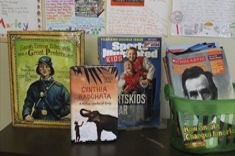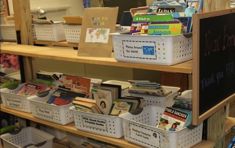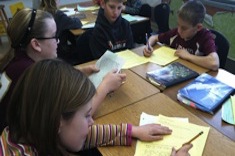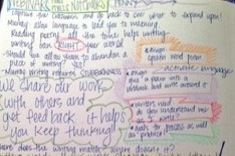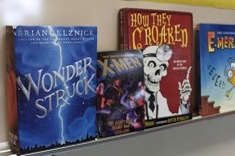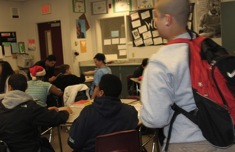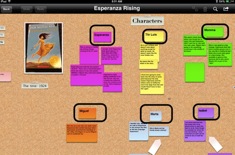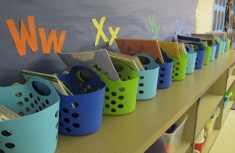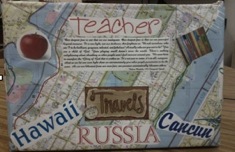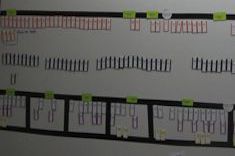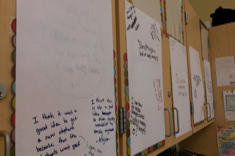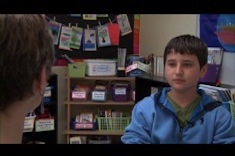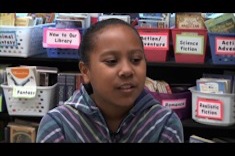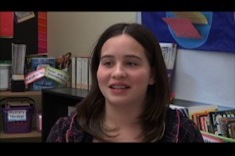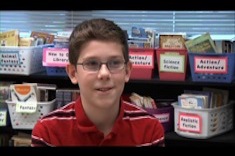6th
Latest Content
Webquests with Middle School Students
Megan Ginther revisits a classic internet research project.
Teaching Search Skill Basics to Students
Bill Bass has advice for teaching web-based search skills to students.
Blurring Genres and Real-Life Readers
The line between fiction and nonfiction can be fuzzy, but Tony Keefer finds what matters most is finding texts that captivate readers.
Exploring Literary Nonfiction with Middle School Students
Holly Mueller and her middle school students have fun exploring the creative aspects of literary nonfiction.
The Power of a Hashtag
Katharine Hale looks at the value of hashtags in helping students harness Twitter in a reading community.
Don’t Judge a Book by Its Cover: Teaching Book Choice Strategies to Middle Schoolers
Katie Doherty helps students make choices for independent reading.
Peer Evaluation of Student Writing
Megan Ginther found she was spending too much time responding to student writing, and just as important, taking on too much of the responsibility for improvement. She tackled the issue by developing a new program for peer evaluation of student writing.
My Middle Schoolers Still Can’t Spell!: Focusing on Individual Students
Gretchen Taylor concludes her two-part series on spelling instruction in middle school. In this installment, Gretchen visits a colleague in the primary grades to get advice and practical insight.
Writing Homework
If your students are already comfortable with an unstructured requirement of 20-30 minutes of reading each night, you may find adding 10 minutes of writing at home works wonders in fostering writing skills. Katherine Sokolowski explains how the assignment works in her classroom.
My Middle Schoolers Can’t Spell!
Gretchen Taylor has a common teacher's lament about spelling, so she decides to do something about it. This is the first installment in a two-part series.
Close Reading and Multiple Layers in Middle School
Christy Rush-Levine uses striking texts that inspire multiple readings by her middle school students.
Using Close Reading to Analyze Propaganda
Propaganda, word clouds, and close reading engage students in Holly Mueller’s sixth-grade class.
Can Books Harm Children? Support and Censorship
Shari Frost asks a provocative question: Can books harm children? She explores practical ways for teachers to walk the fine line between support and censorship in matching books to students.
What Kenny Taught Me
Jennifer Schwanke has a student who just won’t sit still and behave appropriately in her middle school classroom. She finally gives up. That’s where the learning begins.
Reading Passports
Justin Stygles develops reading passports as an alternative to traditional reading logs with his fifth- and sixth-grade students.
Digital Boards for Formative Assessment
Katharine Hale has moved much of her reading response to digital boards, which are also a useful tool for formative assessment.
Effective Organization
Ruth Ayres has tips for organizing desks, tables, chairs, and materials to support literacy learning.
Shoebox Autobiographies
Susan Dee uses shoebox autobiographies to build community and relationships with students early in the fall.
Giving Audio Feedback to Student Writing
If you find yourself buried in student work that needs a response, you’ll enjoy suggestions from Bill Bass for using a nifty new online tool.
30 Books in 30 Days
Justin Stygles uses the 30 Books in 30 Days project to introduce his sixth graders to a wide variety of authors and genres.
Giving Up Television
Gretchen Taylor finds giving up television enables her to reconsider many habitual behaviors.
Nonfiction Book Blitz
Justin Stygles finds a nonfiction book blitz is the perfect unit for closing out the school year.
Final Literacy Contracts: Student-Generated Themes
Megan Ginther and Holly Mueller close out the year with their final literacy contracts. It’s time for students to take ownership of their learning, so they select the themes.
Capturing the Elementary Years with Photo Essays
Justin Stygles helps his sixth graders prepare to move to middle school with a photo essay assignment in the last weeks of school.
The Data Wall Debacle
Shari Frost has a suggestion for what shouldn’t be on classroom walls: student assessment scores. She explains why this practice can be harmful to students.
Nonfiction Graffiti Walls
Katie Doherty uses nonfiction graffiti walls as a tool for building response skills and community with her sixth-grade students.
Reading Interviews: Part 3
We conclude our video series of end-of-year reading interviews with Ruth Shagoury. In this installment, she asks students about how they have changed as readers throughout the year.
Writing Interviews: Part 3
Ruth Shagoury’s end-of-year writing interviews finish with questions about change and the teacher’s influence on writing.
Reading Interviews: Part 2
Ruth Shagoury asks sixth-grade students about reading at home and how they have changed as readers this year.
Writing Interviews: Part 2
Ruth Shagoury’s end of year writing interviews with sixth graders continue with questions about writing strengths and weaknesses.
Browse Content By
Type
Category
- Assessment Tools
- Big Fresh Archives
- Booklists
- Choice Numeracy
- Classroom Design
- Common Core
- Community Building
- Conferring
- Content Literacy
- Digital Literacy
- English Language Learners
- Equity
- Family Relations
- Free Samples
- Guiding Groups
- Leadership
- Literacy Coaches
- Mentor Texts
- Minilessons
- New Teacher Mentors
- Podcasts
- Poetry
- Quote Collections
- Reading Strategies
- Self Care
- Struggling and Striving Learners
- Talking and Listening
- Teacher Study Groups
- Teaching Reading
- Teaching Writing
- Word Study and Vocabulary
Author
- Melissa Quimby
- Nawal Qarooni
- Gwen Blumberg
- Julie Cox
- The Lead Learners
- Hannah Tills
- Josie Stewart
- Ruth Metcalfe
- Mallory Messenger
- Becca Burk
- Jodie Bailey
- Vivian Chen
- Mary Brower
- Tiffany Abbott Fuller
- Stephanie Affinito
- Ruth Ayres
- Leigh Anne Eck
- Heather Fisher
- Shari Frost
- Julie Johnson
- Suzy Kaback
- Gigi McAllister
- Shirl McPhillips
- Melanie Meehan
- Cathy Mere
- Debbie Miller
- Tara Barnett and Kate Mills
- Tammy Mulligan
- Dana Murphy
- Bitsy Parks
- David Pittman
- Brenda Power
- Heather Rader
- Matt Renwick
- Mandy Robek
- Christy Rush-Levine
- Gretchen Schroeder
- Jen Schwanke
- Brian Sepe
- Katherine Sokolowski
- Stella Villalba
- Jennifer Vincent
Grade Level
Choice Literacy Membership
Articles
Get full access to all Choice Literacy article content
Videos
Get full access to all Choice Literacy video content
Courses
Access Choice Literacy course curriculum and training



